#Sira Kulibali
Text
Analysis
Everything Amazing About The Book of Negroes - Feminist Literary Theory pt. 1
I have recently finished reading The Book of Negroes by Lawrence Hill and it was amazing. Hill has clearly researched every detail and does everything right.
When viewing the novel from a feminist perspective, I was surprised with the results.
Independent Women
Although the novel is set in a time when women were considered the weaker sex and not as capable as men, the following women demonstrate their strength in their own ways in order to survive.
Sira Kulibali
Aminata’s mother
She is a Bamana, yet marries a Fulbe and lives in a Fulbe village where she has learned much of the language
Has earned the respect of other women by learning some Arabic prayers, pounding millet and collecting shea nuts with everyone else
Has a reputation for catching babies. Her reputation is so good that she travels to different villages to deliver babies and is paid well
Teaches her daughter her trade which later helps her to survive
Georgia
Becomes a mother figure to Aminata
Stands up to her owner, Appleby, in order to save Aminata from death
Mentors Aminata when she is new to the plantation. She helps her learn the work on the plantation, the language and how to act around certain people
Teaches Aminata herbal remedies for common illnesses. This knowledge helps Aminata to earn a living in Canvas Town
May
Aminata’s daughter
Learns to read and write because she remembers her mother’s love for words
Escapes slavery by jumping out a window, barefoot, at 11
Aminata
Survives crossing the ocean on a slave ship at 11
Learns to read and write in her third language
Resists punishment from Appleby
Earns a living by delivering children and providing medical services
Begins teaching other people to read and write
Escapes slavery in Manhatten
Contributes to the Book of Negroes which helps her gain passage to Nova Scotia
When in Nova Scotia she deals with extreme and violent racism and extremely poor living conditions
“Negotiate[s] like a man” (Hill 424)
Lives out the remainder of her days in London where she helps the abolitionist movement by telling her personal story
For part 2 of the analysis click here
0 notes
Photo

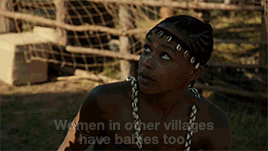

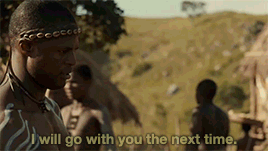
(Mamadu): "No more. No more travelling so far to bring babies into the world."
(Sira): "Women in other villages have babies too, and your daughter needs to learn the trade."
(Mamadu): "I will not allow it. It's not safe."
(Sira): "I have walked this country my whole life. I will travel as freely as anyone."
(Mamadu): "I will go with you the next time."
(Sira): "No, you will not."
(Mamadu): "I'm coming with you!"
The Book of Negroes, Episode 1
#The Book of Negroes#Book of Negroes#Mamadu Diallo#Sira Kulibali#Aminata Diallo#Andile Gumbi#Thishiwe Ziqubu#Shailyn Pierre-Dixon
68 notes
·
View notes
Photo
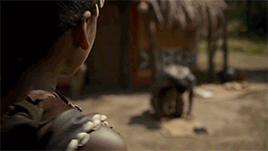
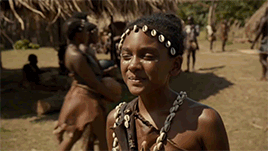
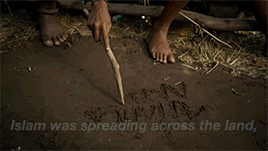

(Aminata narrating): My father made jewelry. He was the only man in the village who had a copy of the Qur'an. From him, I learned Fulfulde and how to read and write in Arabic. Islam was spreading across the land, and in Bayo, my father was among a few converts.
[Aminata writes in the sand with a stick]
(Mamadu): "Now, read what you wrote."
(Aminata): "'Allah Akbar'".
(Mamadu): "Good. Very good. Now, keep practicing."
The Book of Negroes, Episode 1
#The Book of Negroes#Book of Negroes#Aminata Diallo#Mamadu Diallo#Sira Kulibali#Shailyn Pierre-Dixon#Andile Gumbi#Thishiwe Ziqubu
198 notes
·
View notes
Photo
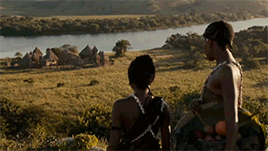

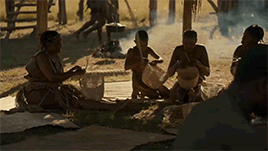

Aminata and her mother arrive home to their village of Bayo, Mali, in 1761.
The Book of Negroes, Episode 1
#The Book of Negroes#Book of Negroes#Aminata Diallo#Sira Kulibali#Shailyn Pierre-Dixon#Thishiwe Ziqubu
10 notes
·
View notes
Photo

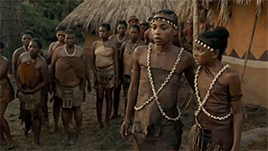
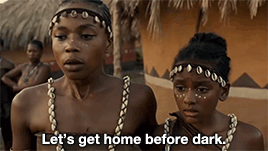

(Man's voice): "The man-stealers took a farmer. That's his blood."
(Sira): "Let's get home before it gets dark."
(Aminata narrating): "Have you seen the moon slide behind the clouds? People started slipping away like that. But unlike the moon, they never came back."
The Book of Negroes, Episode 1
#The Book of Negroes#Book of Negroes#Aminata Diallo#Sira Kulibali#Shailyn Pierre-Dixon#Thishiwe Ziqubu
85 notes
·
View notes